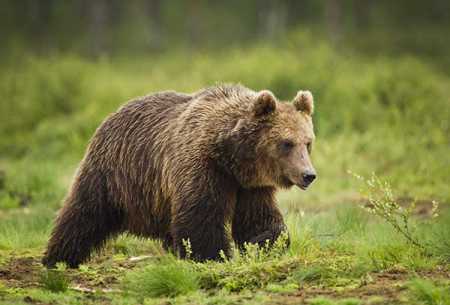|
Tue, 21 Apr, 2015 12:07:56 AM FTimes – STT Report, April 21  File Photo – Lehtikuva. Bears have woken up for summer, and many of those who hibernated in Russia have come back to this side of the border.
The Natural Resources Centre estimates that up to 30 per cent of bears in Finland go to Russia for hibernation.
“They do not necessarily go far beyond the border. Perhaps it is just more peaceful there,” says Natural Resources Centre researcher Samuli Heikkinen.
For example, in southeast of Kuhmo, there is an area where many tagged bears spend their winters. A few years ago, they travelled quite far to find a place to hibernate.
“By studying carcasses left by one marked bear, it was clear that he disappeared and remained hidden all winter. In the spring, the bear returned to the kill, his collar spewing out GPS data the whole time. The bear moved on a very straight line toward the Jänisjärvi (Hare Lake) in Russia, about 250km from Kuhmo and then slept for the winter under an old picnic table.”
The information from the collars shows that bears apparently seek out familiar sleeping grounds -- not necessarily the exact same nest, but somewhere near.
According to Heikkinen, there is no scientific evidence whether bears gravitate toward their birthplaces for hibernation.
“We have an inspired notion of generational hibernation grounds. Unfortunately, only after the fact, did we discover a group of nests on an island in the Saimaa lake discovered by loggers.
Because of the logging, though, no samples could be taken. They might have revealed whether the island was the hibernation ground for a family of bears.”
In the north, the bears are still sleeping. On the south side of the Oulu-Kajaani line, a number of bears have been observed moving around. In many areas of northern and eastern Finland, covered in thick snow, the bears are still sleeping.
“Newly awakened bears stay near the nest for more than a week without seeking out food. My guess is that they’re still trying to start their engines,” Heikkanen says.
With 30 to 40 per cent of their body fat lost, though, the bears soon start walking around. According to Heikkanen, this is the time when bears are hunting for meat protein.
Before the hunting season last fall, the Finnish bear population consisted of roughly 1,500. The amount is expected to stay the same, after counting the spring cubs and the migrants from Russia return.
More News
|
|
Finland Times
| Wednesday, 24 April, 2024 |

